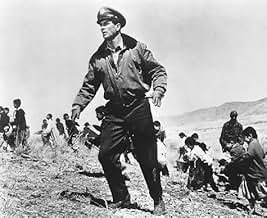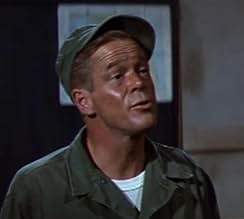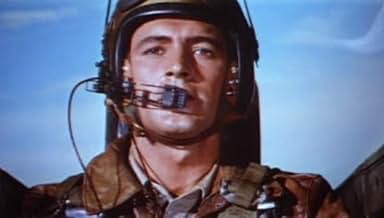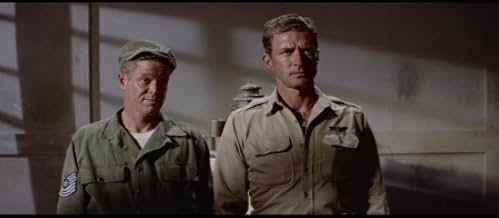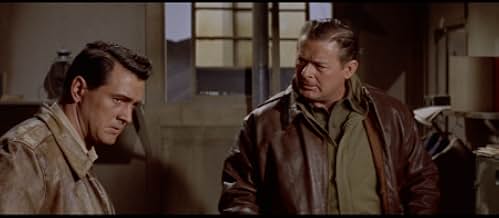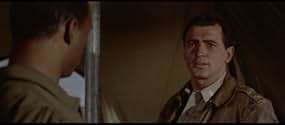Agrega una trama en tu idiomaA remorseful bomber pilot-turned-minister rejoins for the Korean War.A remorseful bomber pilot-turned-minister rejoins for the Korean War.A remorseful bomber pilot-turned-minister rejoins for the Korean War.
- Dirección
- Guionistas
- Elenco
- Premios
- 2 premios ganados en total
- Mess Sergeant
- (as Alan Hale)
- Gen. Kim
- (escenas eliminadas)
- Dirección
- Guionistas
- Todo el elenco y el equipo
- Producción, taquilla y más en IMDbPro
Opiniones destacadas
Rock Hudson is very good as Colonel Dean E. Hess, who in real life was an American minister and United States Air Force colonel who was involved in the so-called "Kiddy Car Airlift," the documented rescue of 950 orphans and 80 orphanage staff from the path of the Chinese advance during the Korean War on December 20, 1950.
As the movie opens we see Hess as a minister but still feels guilt from an accidental bombing of a church and orphanage in Germany during WW2. He isn't sure he is genuine as a minister and goes back into active duty, training Koreans to fly fighter planes. But his soft spot for orphans gets him involved in providing care for them, an activity that he continued in future years. He died, aged 97 in 2015.
Good movie.
In "Battle hymn" ,Rock Hudson portrays an air force officer who destroyed an orphanage with thirty-seven children in WW2 and tries to redeem his soul.But it is not as convincing.As users have already pointed out,the true story was altered .The ideology is not clear; the old man's words are not so wise :war is necessary and that is the way God planned it ....
Sirk's pacifism was better applied on "A time to love and a time to die" based on EM Remarque's novel which is much superior to this preachy effort.Colonel Hess deserved a better movie.
Like this ?try these.....
The inn of the sixth happiness (Robson)
55 days at Peking (Ray)
The keys of the kingdom (Stahl)
Battle Hymn is based on a book by the Reverend Dean Hess who after service in World War II as an Army Air Corps flier enters the ministry. It seems as though he accidentally bombed an orphanage in Germany, killing several children.
In an effort to redeem himself he enters the ministry, but he feels himself going through the motions of his faith at the church he's assigned to in Ohio. When the Korean War starts, the newly formed Air Force needed not only pilots for combat, but pilots to train the newly forming South Korean Air Force. Hudson takes leave of his church assignment and goes to Korea.
Once there and quite by accident he gets involved with the littlest victims of war, the orphan kids of Korea who know no politics, only that their world is being destroyed. And when the North Koreans start to push the South Koreans and their allies into the Pusan perimeter Hudson organizes a march and then an airlift of over 400 children south to an orphanage.
Rock Hudson had really come into his own as an actor having received an Oscar Nomination for Best Actor for Giant. He brings to Dean Hess an infectious sincerity. As Hess both as minister and Colonel USAF he feels the responsibility of command and faith more clearly than he could ever have been just pastoring a church. In his scenes with Anna Kashfi and Philip Ahn on the march and airlift with the Korean orphan kids, he's just great. And his acting high point comes when he comforts the dying Don DeFore who was his friend in both wars. Hudson really reaches some sublime levels there.
Dan Duryea normally playing some of the nastiest villains ever on the screen shows the good side in his role as the tough Air Force sergeant who helps Hudson in his mission. And James Edwards who for some better breaks could have been the first black actor in leading roles instead of Sidney Poitier, is just great as the pilot who himself machine guns some children while on a mission. Hudson's scene in revealing himself to Edwards and urging to seek divine forgiveness is also touching and compelling.
Were we ever a silly people at times back in the day. If Rock Hudson had been open about his sexuality in 1956 he would have had no movie career. If Battle Hymn were made today it would probably be the subject of as much controversy as End of the Spear. As if love and compassion and care for orphans can only be the products of the straight people in this world.
One other note. Originally offered the role was Robert Mitchum who was turned down by the real Dean Hess because of his marijuana bust in 1948 as not having the proper image to play a minister. How ironic indeed.
Battle Hymn is a fine film, probably belongs on Rock Hudson's top ten list. Catch it if it is ever shown on TCM or AMC.
In his book "Sirk on Sirk" Michael Halliday sheds some light on this. Sirk had broken his leg badly and had to direct from a wheelchair which severely limited him. But the main reason for this somewhat heavy handed film was the presence of Dean Hess on the set and his overseeing each scene.
The film is a biography of Dean Hess himself. A man who turns to the church after the trauma of bombing a German orphanage and killing 37 children, Hess leaves his position of preacher in small town Ohio and volunteers for service in Korea. It's an odd choice for a man of his past, but "Killer Hess" as he was known, gets the opportunity to save Korean orphans in the process, putting to sleep his inner demons and putting things right in the world.
Sirk was very put off by Hess' presence on the set and more so by his input. He was clearly a man of much ambiguity, something that fascinated Sirk. Yet Sirk was unable to really express this in meaningful way on the screen. He wanted to give Hess a drinking problem as a way of expressing his pain, but Hess would hear nothing of it. He clearly wanted to be portrayed as a holier than though hero. The result is that the film has an awful self congratulatory feel about it.
Sirk was fascinated by characters who conceal within themselves a deep conflict. To him these were the most interesting of all. In all the movies Sirk made with Rock Hudson, he always cast him as the stabling influence and a foil to those unstable characters around him. Robert Stack in both "Written on the Wind" and "Tarnished Angels" is a perfect example of a split character playing against Hudson as the basically good, well grounded opposite. It's of course extremely ironic since in real life Rock Hudson was surely terribly conflicted by his concealed homosexuality while idolised by the masses as a model of masculine heterosexuality. Perhaps that is part of Sirk's affinity for him. Yet Sirk felt that Hudson's simplicity and basic goodness were suited to playing uncomplicated characters. "Battle Hymn" is the only film in which Sirk cast Hudson as a conflicted character. Had his character been better written there may have been a chance to pull it off. But as it stands, it's a competent and respectable performance, but something of a missed opportunity for Hudson.
The rest of the cast acquit themselves well. Anna Kashfi is particularly effective with her ethereal presence. James Edwards deserves a mention, since his role as a black fighter pilot was certainly ground breaking for its time.
There are however some really cringe inducing moments such as the aforementioned James Edwards breaking into "Swing Low" after an air raid and the final scene of the Korean orphans singing "Battle Hymn of the Republic" for Hess as he returns to Korea with his wife. These moments are meant to be uplifting, but seem now to be in somewhat poor taste.
The Korean children in the film were actually Korean orphans and they are a delight. Sirk had great affinity with young children who in turn gave memorable performances in his movies.
But when all is said and done, "Battle Hymn" is a film best forgotten, unlike his other war film, the remarkable "A Time to Love and a Time to Die" which he would soon make.
¿Sabías que…?
- TriviaRobert Mitchum lobbied for the lead role. However, the real Col. Dean Hess wouldn't hear of a former jailbird portraying him. He personally approved Rock Hudson instead, not realizing that Hudson was gay.
- ErroresWhen Skidmore is wounded and coming back to land, the exterior shots show the canopy open, but in the closeups of Don DeFore (Skidmore) the canopy is closed.
- Citas
Old Man, Lun-Wa: But, Colonel, you seem troubled.
Col. Dean Hess: There's nothing so terrible as war. I killed today.
Old Man, Lun-Wa: Yes, war is evil. I see what is in your heart. Colonel, may a poor, old carver of ivory babble for a moment? Understand that this is no more than babble and may not have more worth than a handful of sand. In times like these can a man of good conscience ask others, 'Protect me, kill for me, but do not ask me to stain my hands?' What must one do when a choice between two evils is all that is offered? To accept the lesser can sometimes be the only choice. In order to save at times we must destroy and in destructiom creates new life.
Col. Dean Hess: Is that the answer?
Old Man, Lun-Wa: The true answer, Colonel, is not in my babble... 'tis in the Book - 'Oh, Lord, though hast seen my wrong. Judge now my cause.'
Col. Dean Hess: Who are you?
Old Man, Lun-Wa: Just a very old man anxious to get back to his stall in Pusan.
- ConexionesFeatured in La dimensión desconocida: Where Is Everybody? (1959)
- Bandas sonorasLittle Brown Jug
(uncredited)
American drinking song
Composed by Joseph Winner (1869)
Sung by Jock Mahoney and soldiers during Thanksgiving celebration.
Selecciones populares
- How long is Battle Hymn?Con tecnología de Alexa
Detalles
- Tiempo de ejecución1 hora 48 minutos
- Relación de aspecto
- 2.35 : 1
Contribuir a esta página



